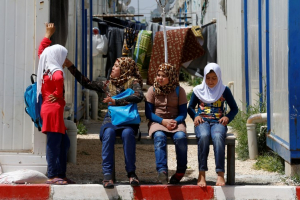Syrian refugees suffering from the effects of the five-year civil war and ongoing terrorism are finding hope and encouragement in the Gospel despite their desperate surroundings.
A native Christian leader in Turkey recently told Christian Aid Mission that his organization is working tirelessly to provide baby formula, diapers, medical care, clean water, shoes, clothes, mattresses and the Word of God to the thousands of men, women and children living in refugee camps.
"We can see on their faces that there is no hope," he said. "But whoever hears the Word of God has hope in their life. We tell the people that the Lord Jesus will never leave you alone; He will never turn His face from you. Whoever accepts Jesus has hope."
According to the United Nations High Commissioner for Refugees (UNHCR), over 3 million refugees have fled to Syria's immediate neighbors Turkey, Lebanon, Jordan and Iraq, while 6.5 million are internally displaced within Syria. Currently, Turkey hosts more than half of all registered Syrian refugees, with at least 2.7 million residing there according to the UNHCR.
Many of the refugees left their home country as rebel forces backed by the United States continue to fight to unseat Russian-backed Syrian President Bashar al-Assad. Others were forced to flee after the Islamic State terrorist group invaded their towns.
While the possibility of peace seems to have vanished, most Syrian refugees do not want to talk of the impossibility of returning to their country one day, the ministry leader revealed.
"They still have hope to go back," he said. "Some people are still thinking, 'Maybe tomorrow I'll be back, maybe next week.' They're not realistic. They're upside down. When we tell them the Good News in Arabic, they get new breath, new hope. That's why they keep calling, wanting us to come and visit and talk with them about Jesus. They say, 'There's peace when you visit us. We feel peace and hope when we hear your stories.'"
Ministry workers told CAM that many of the refugees, some of them highly educated, cannot find steady work or are underemployed at best. Many refugees have lost husbands or wives; one native Christian leader in Turkey estimated 25 percent of refugees are widowed.
"Widows cannot work even if they find a job, because they have nowhere safe to leave their children," he said. "There are also many orphaned children."
The ministry director revealed that those lucky enough to find a job often work long hours and are exposed to very harsh conditions. The men are forced to wake very early in the morning to stand in the human market, hoping to get work as a coolie or in construction, while most of the women and children beg at traffic lights.
"Our daily goal is to provide their basic needs to survive - when we can provide for these needs, they do not have to worry about their kids, so they will have time to think about the Word of God," the ministry director said. "Our weekly goals are to preach the gospel and explain the Word of God."
An indigenous ministry leader in Jordan revealed that the thousands of refugees living there long for jobs. The ministry plans to help churches establish cottage businesses on their premises marketing consumer items such as women's scarves - and employ Syrian refugees to help produce and sell them.
"It's a different feeling when a man comes home and he has some food in his hand, some bread for his children, chocolate or chips - that feeling is missing; their life has changed with this new status," he said. "They say, 'We're like prisoners. We want to feel like we're human. We'll work at whatever we can get.'"
The ministry also works to counsel those affected by trauma, as refugees tend to store feelings inside that they're not even aware they're concealing. The ministry leader said he fears that one day, something may trigger release of the pent-up trauma, and they won't know why they feel no control over what is happening to them psychologically, he said.
"It's especially important for children," he said. "It's heartbreaking - there's bedwetting, nightmares. One of the important things is to have a center for them and have some game therapy and play therapy. The family can bring them and have counseling as the kids play."
Earlier, a ministry worker in Turkey told CAM that after experiencing atrocities at the hands of Islamic extremists and the dismissive attitude of Turkey's government, many of the refugees have begun asking about Jesus and Christianity.
The ministry director recalled, "We were telling them the difference between Islam and Christianity, and when they heard the difference, they said, 'We didn't know the way of Christianity that you are telling us about.' We are so glad that the Lord is using all of us to reach them, to correct their way and to redirect them. Please pray for us so we can reach more people, and we are also praying for you all so we can assist them in their suffering lives."
To help indigenous missionaries meet needs or to learn more about Christian Aid Mission, visit their website.

















